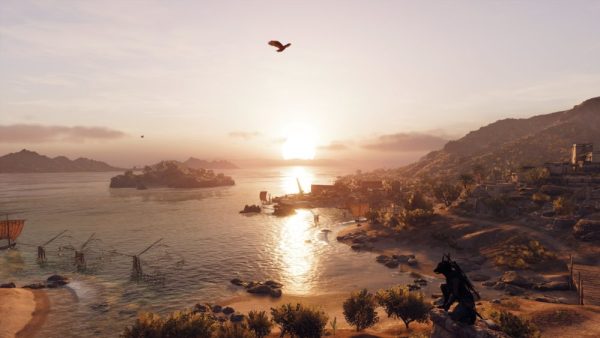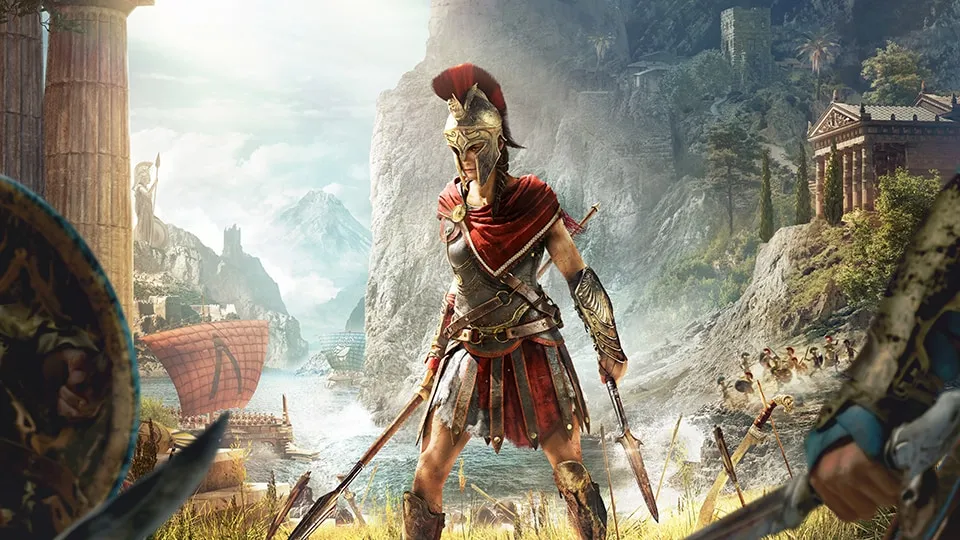Assassin’s Creed Odyssey for PlayStation 4
The Assassin’s Creed franchise had been meandering for quite some time before Origins rolled around last year, and Ubisoft decided to experiment with some RPG elements. Player levels were more important, there was a brand new gear system, along with a larger focus on open world exploration. Origins was a good game, and a step in the right direction for the franchise. Assassin’s Creed Odyssey is even better.
For the first time in the series, Assassin’s Creed Odyssey allows players to choose their desired gender at the start of the game. Alexios and Kassandra are Spartan siblings who were separated when they were young, and you’ll be able to play as whoever you like for the whole game. Not only that, Odyssey takes the RPG elements of Origins and goes even further with them. Now, there are BioWare-style dialogue choices and story branches. You’ve got side quests with different outcomes, and even the main story has a few different progression paths you can check out.
Odyssey’s quest choices might seem tacked on and very straightforward at first glance, but as I spent more time with the game, I got to see more possible combinations and permutations of different scenarios that could’ve played out instead of the one I got. The game’s branches get pretty staggering later on, and Ubisoft definitely did an excellent job with those story deviations on their first go.
That said, the way Alexios and Kassandra interact with the world feels like a missed opportunity. Aside from a different character model and voice actors, both characters are essentially identical. You can breathe life into them by choosing the dialogue options that suit you best, but for the most part, there’s so little difference between Alexios and Kassandra that your choice of gender doesn’t feel all that important. In keeping with the BioWare-style RPG format, Odyssey also introduces romance options, which are painfully shallow and one-note.
Aside from a single instance that I can think of, every other potential romantic partner will fall prey to your charm and wiles if you simply choose the dialogue options with a heart symbol next to them. You’ll do a quest, maybe two, for them, choose the heart options, and eventually you’ll get it on. There are no consequences for romancing multiple people, and no ‘future’ to speak of with whichever lucky NPC you pick as your one true paramour. It’s definitely a little disappointing and underwhelming.
Thankfully, Assassin’s Creed Odyssey is quick to make up for these shortcomings with some seriously witty and hilarious dialogue. The Assassin’s Creed franchise has always been very self-serious, even with the more laid-back Assassins like Ezio and Jacob Frye. With Odyssey, however, Ubisoft isn’t afraid to sprinkle a little humor into virtually every aspect of the game. Kassandra (or Alexios) is pretty cheeky by nature, and isn’t afraid to taunt her foes in the most demeaning ways. Like, say, stealing their fake eye and stuffing it up a goat’s ass in front of them. All while maintaining eye contact, with a slight smirk on her face.
Even the side quests are filled with memorable characters with tons of comic relief to spare. Sure, you’ll probably still spend most of your time clearing out forts and killing a bunch of enemies. But every so often, you’ll stumble upon a few gems like rescuing a naked man who’s convinced some people he’s a god, or running errands for a priestess who won’t stop trying to get into your pants. With how heavy the series could get at times, this is definitely a refreshing change of pace.

That’s not to say that the main story isn’t without some brevity, though. In fact, Assassin’s Creed Odyssey’s story isn’t afraid to go to some dark places, depending on your choices, and things can get pretty intense. Without spoiling too much of the good stuff, Kassandra’s story began when her family was torn apart on Mount Taygetos. After losing her brother and parents, she became a mercenary who just lived life one day at a time. That is, until she gets roped into a nationwide conspiracy involving an evil and mysterious organization, and discovers some shocking truths about her lineage.
Unlike past games in the series, Odyssey doesn’t really feature the classic good vs. evil war like we’ve been seeing with the Assassins and Templars. While the cultists that Kassandra faces are certainly evil, they’re nothing like the Templars we’ve seen so many times before with their warped sense of justice. The battles and conflicts are mostly waged by Greece and Sparta, and Kassandra is able to pledge her allegiance to either side at any given time, as long as it suits her fancy. Assassin’s Creed Odyssey is very much a personal story about family, and Kassandra’s own Spartan heritage helps to strengthen the game’s plot elements.
Indeed, picking Ancient Greece and Sparta as the backdrop for this epic story was a wise choice on Ubisoft’s part. Given how violent we know the Spartans to be, it’s fascinating to see how that culture plays into Kassandra’s story and the way she interacts with her family. On one hand, parents are convinced that they must push their children to their very limits in order to bring glory to Sparta, even if it means that they’ll die trying. And on the other, the children are conditioned to believe that is their singular destiny. As Kassandra gets pulled back into her familial complications as an adult, it’s compelling to watch her struggle to reconcile her desire to see her family again and her resentment for the way everything had fallen apart. Assassin’s Creed Odyssey’s story is easily the most powerful and impactful I’ve seen in the series thus far.
Odyssey also introduces a few new systems to play around with. The Mercenaries system is similar to the Nemesis mechanic we’ve seen in Shadow of Mordor, but perhaps a little less in-depth. As a mercenary, Kassandra can make a name for herself and rise through the ranks by taking down other mercenaries more powerful than her.
The game comes with a Mercenaries tab that allows you to read the names and brief descriptions of all the other fighters in the world. Kill enough of them, and you’ll rise up the ranks. And this comes with a few benefits, such as better shop prices. Commit crimes in a city, though, and some of those mercenaries might get hired to actively hunt you down. At this point, you can either kill off the bounty sponsors, or just fight the mercenaries as they cross your path.

About midway through the story, you’ll also gain the ability to start hunting down members of the mysterious cult that’s trying to destroy the world. This is easily the best and most interesting thing Assassin’s Creed has done in the past decade.
Because the Cult of Kosmos is a secret organization, the game isn’t going to just feed you their identities willy-nilly. Instead, you’ll have to track them down based on clues you’ve gathered from story missions and side quests. Once you’ve got enough information to identify them, their locations are revealed to you on the map, and you can eliminate them for a piece of Legendary gear.
There’s a very strong sense of satisfaction to be had from following a random side quest that you thought would just be good for experience points, then finding out that it actually leads you to yet another vicious operation being handled by a cult member. Ubisoft has done a wonderful job of putting these cult members everywhere in the game, making them feel truly insidious, sinister, and like they’ve really got their eyes and ears everywhere. The Legendary gear that drops from the cultists certainly makes the hunt worth the effort, too.
The gear system makes a return in Odyssey as well, where you can kill stronger enemies for rarer gear. In Assassin’s Creed Odyssey, the game takes things a step further with engravings, which are basically perks that you can add to your equipment. Epic and Legendary gear have more perk slots, making lower tier items much less valuable in the long run, even if they do have higher attack or defense stats.
To go along with all these spiffy RPG and leveling mechanics is, of course, the beautiful open world that Assassin’s Creed has become so known for. At this point, you probably need no introduction to Ubisoft’s brand of open world games. You’ll have a giant map, filled with different regions and continents you can travel to via ship, along with points of interests and viewpoints to interact with.
As you travel across the world, you’ll come across side quests, camps and forts to clear out, and towns filled with iconic and historical locations, all while being treated to gorgeous sunsets and moon-drenched landscapes. Assassin’s Creed Odyssey is a beautiful game, and its world full of varied and lush environments that will take your breath away. It’s not quite on par with last year’s Horizon Zero Dawn, in terms of graphical fidelity and lighting perhaps, but it’s nothing to scoff at. It’s just a shame that the game as a whole is let down by repetitive design and some pretty annoying technical issues.
While playing on a PS4 Pro, there were a handful of times where the game’s frame rate would just go right to the toilet, and I straight up wasn’t able to play the game properly till I rebooted it. Another time, I’d left the game idling for a while as I went off to fix up a meal, only to come back and see that the game had froze entirely. These issues weren’t persistent throughout my experience with Odyssey, but they happened frequently enough that I made it a point to manually save my game every now and then, just in case something unfortunate happened.
Odyssey also continues to suffer from repetitive open world design —a flaw that’s been plaguing the series for years now. After your first 10 or so hours with Assassin’s Creed Odyssey, you’ll quickly realize that you’ve already seen all that the game has to offer from a gameplay perspective. Most of the main and side quests follow the same format: talk to an NPC, gather information, head to another location (usually a fort or a camp), then kill everyone there. Sometimes you’ll be tasked with just rescuing an NPC from a guarded location, but you usually have to kill everyone there anyway because it can be so challenging to get them out safely.

The nice thing about Odyssey is that its combat system seems to have been refined. Movement is more fluid than it was in Origins, and Kassandra feels swift and responsive in battle. The combat system is still getting held back by the fact that the hit-boxes can feel a little off sometimes, and it’s not always easy to read AI movements. But for the most part, combat feels good.
Even so, no matter how good the combat is, it’s still going to feel dull after tens of hours of doing the same things over and over again. Playing through Assassin’s Creed Odyssey, I found myself enjoying the stories presented through the side stories, but I also missed the more epic chase sequences we used to see in earlier Assassin’s Creed games, along with the stealth missions where you had to stalk targets through the streets. Combat is nice and all, but more mission variety would’ve been nice.
Honestly, though, none of these complaints could hold me back from giving Assassin’s Creed Odyssey a wholehearted recommendation to either series newcomers or veterans. This game takes the groundwork of Origins, and builds upon it with a more refined combat system, new and interesting enemy mechanics to get used to, and one of the strongest personal stories we’ve seen in the series.
It’s strange, because Odyssey barely even feels like an Assassin’s Creed game. Take away Layla Hassan and the “Assassin’s Creed” brand from the title, and I’d just look at this game as a really strong, standalone historical fiction video game. Despite that, or perhaps because of that, Assassin’s Creed Odyssey quickly becomes the best entry we’ve seen from the series in the last 10 years. Ubisoft has fully embraced the RPG formula with Odyssey, and they’ve created a game that feels refreshingly confident and self-assured. There are still a few missteps to work out, but for now, Assassin’s Creed Odyssey is one of the most charming open world RPGs you’ll play this year.
Score: 4.5/5 – Great
Pros
| Cons
|
For more information on how we review games, check out Twinfinite’s review policy here.














Updated: Oct 1, 2018 08:40 pm